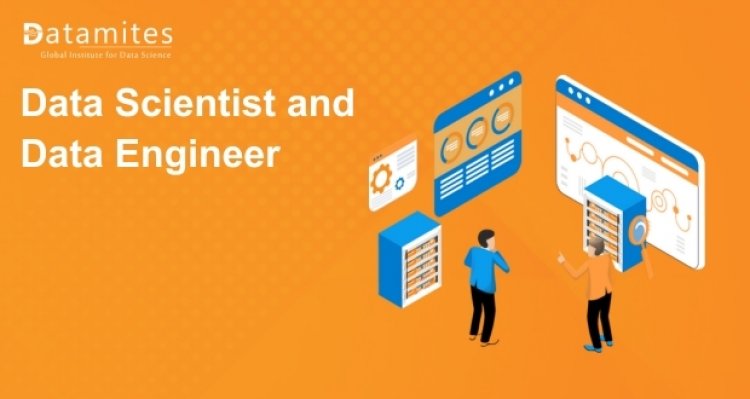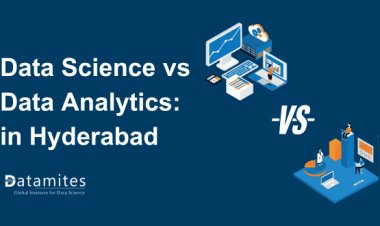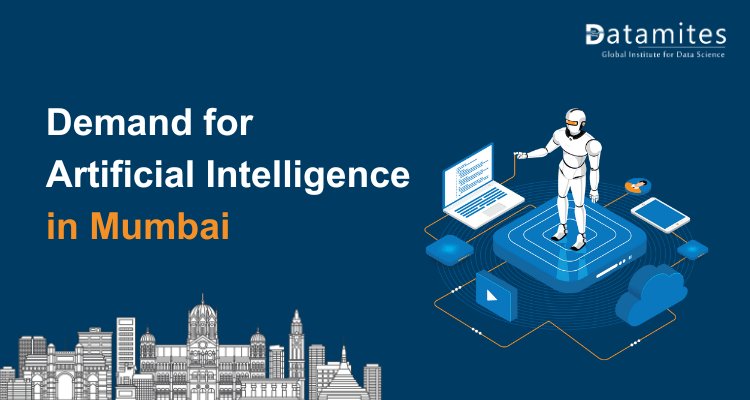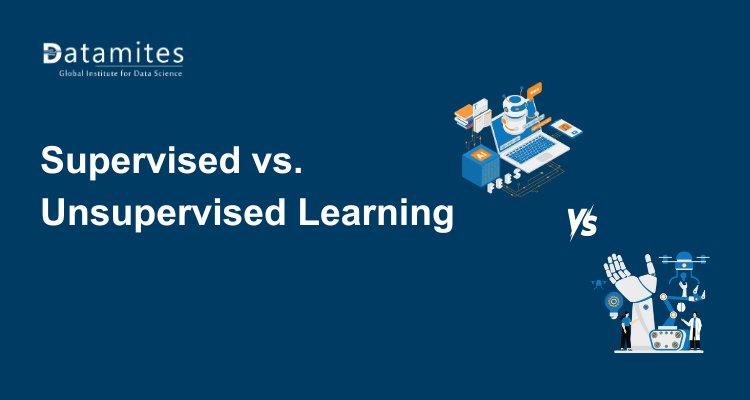Difference Between Data Scientist and Data Engineer
A Data Scientist analyzes and interprets complex data to derive insights, while a Data Engineer designs, builds, and maintains the infrastructure that allows data to be processed and stored efficiently.

The Bureau of Labor Statistics predicts a 22% increase in job growth from 2020–2030, which is significantly higher than the average growth rate of other vocations, reflecting the recent spike in demand for employment in data science. This demand will persist as long as organizations prioritize the creation, collection, and analysis of big data to aid in the management of their operations.
The following article provides insight into the key distinctions between two of the more well-known careers in data science, data scientist and data engineer, and covers all the information you need to know in order to make an informed decision about the profession that is best for you.
Refer these articles:
- Data Science vs. Big Data vs. Data Analytics
- 10 Myths about Data Science
- Essential Skills That You Need To Become A Data Scientist
Data Scientist Vs Data Engineer
Despite the fact that data engineers and data scientists share some abilities and that in the past, data scientists were expected to execute some of the duties performed by data engineers, the two professions are clearly distinct and diverse.
Roles and Responsibilities
It’s a good idea to think of data scientists and engineers as complementary roles. Systems that enable data scientists to do their duties are created and optimized by data engineers. Data scientists interpret data while data engineers manage massive amounts of it.
What Does a Data Scientist Do?
A data scientist analyzes complex datasets to uncover insights and trends, helping organizations make informed decisions. They employ statistical methods, machine learning, and programming skills to extract valuable information. Data scientists also communicate findings to non-technical stakeholders, guiding strategic choices and enhancing business performance through data-driven solutions.
Ultimately, data scientists play a pivotal role in transforming raw data into actionable intelligence, driving data-driven strategies and solutions for organizations across various industries.
What Does a Data Engineer Do?
Data engineers are experts in data who arrange the data architecture for analysis. They are primarily concerned with the production readiness of the raw data, as well as components such as formats, resilience, scaling, data storage, and security. Designing, constructing, testing, integrating, maintaining, and optimizing data from many sources is the responsibility of data engineers. They intend to build open data pipelines that facilitate real-time analytics by combining a number of big data technologies.
Education And Requirements
A bachelor’s degree in computer science or a closely related subject like mathematics, statistics, economics, or information technology is held by many data engineers and data scientists. Furthermore, although higher degrees are typically preferred by employers, those without them might nonetheless find employment in data science or data engineering.
Requirements To Become a Data Scientist
Data scientists are frequently given large amounts of data to work with when there are no obvious business problems to solve. In this case, the data scientist will have to examine the data, formulate the relevant queries, and present their findings. Because of this, data scientists must possess a thorough understanding of numerous approaches in big data infrastructures, data mining, machine learning algorithms, and statistics. They must keep up with all the most recent technical developments since in order to run their algorithms properly and efficiently, they must also interface with data sets that come in a variety of forms.
Data scientists are expected to be knowledgeable on tools like Hive, Hadoop, Cassandra, and MongoDB as well as programming languages like SQL, Python, R, and Java.
Requirements To Become a Data Engineer
Data engineers are often proficient in programming languages such as Java, Python, SQL, and Scala. They typically have backgrounds in software engineering. Alternatively, they may have a degree in statistics or mathematics, which allows them to solve commercial problems using a variety of analytical techniques.
Most employers prefer to hire data engineers who have a bachelor’s degree in computer science, applied math, or information technology. Applicants may also be required to have a few data engineering certifications, such as Google’s Professional Data Engineer or IBM’s Certified Data Engineer. It is also advantageous if they have experience building large data warehouses capable of performing Extract, Transform, and Load (ETL) operations on large data sets.
Refer these articles:
- How to Become a Data Engineer in India
- How To Become Data Scientist In India
- Data Science Training Course fees in India
Career Path
Although there is no single route to become a data engineer or data scientist, the following are some typical paths that people have taken to reach their goals.
Career Path For a Data Scientist
Many data scientists start their careers in entry-level data science positions, whether through an internship or as a junior data scientist. Before moving on to creating their own experiments and tackling more challenging business problems, these entry-level employment provide young data scientists the chance to continue honing their technical abilities and work on projects that have been assigned to them.
Career Path For a Data Engineer
In most cases, data engineering is not an entry-level position. As a result, numerous data engineers start their careers within software engineering or business intelligence/systems analytics, roles that expose them to the structure and processes required by the data science sector.
Most data engineers work as data architects, solutions architects, and database developers to improve their data engineering skills, obtain a deeper understanding of cloud computing and data processing, and gain experience with ETL and data layers. Some persons may work in data analytics before moving on to data engineering in order to gain a greater awareness of what data analysts and data scientists require.
Refer these articles:
- How much is the Data Engineer Course Fee in India
- Data Scientist Course Fees in Bangalore
- Data Scientist Course Fee in Hyderabad
Data Scientist Vs Data Engineer Salary
Both roles present a highly satisfying and successful career for the analytical mind.
What Does A Data Scientist Earn?
The kind of work, a data scientist’s credentials, and the workplace’s location all have an impact on how much money they make. According to Glassdoor, a data scientist gets an average salary of ₹139,000 per year.
What Does A Data Engineer Earn?
Data engineers are paid differently depending on their amount of experience, the nature of their employment, and where they work. The average annual compensation for a data engineer is roughly ₹142,000, according to Glassdoor.
Conclusion
Data scientists and engineers collaborate closely. Therefore, it is crucial to ensure that team members complement one another properly. DataMites® Certified Data Engineer (CDE) and Certified Data Scientist courses are the most well-known, comprehensive, and career-focused courses in the world. The courses are regularly updated in accordance with market demands and improved to make the learning process designed to support lean learning.
DataMites Institute is a leading player in data science education, offering comprehensive courses. With a focus on practical skills, it equips students with in-demand analytics tools. DataMites stands out for its industry-relevant curriculum and expert instructors, ensuring students thrive in the dynamic field of data science.
DataMites offers a globally recognized Data Engineer course, designed to equip learners with essential data engineering skills. The curriculum includes Python, Big Data, SQL, Data Wrangling, and Pandas, with practical, hands-on training for real-world scenarios. Accredited by IABAC, the program provides an industry-recognized certification to boost career growth. With expert guidance and job support, DataMites prepares professionals to thrive in the data-driven world.





